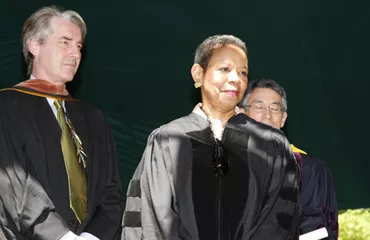President Bloom's Introduction of Mary Schmidt Campbell '69

Mary Schmidt Campbell, you are a tireless champion of artists and the arts, a powerful educator, an esteemed scholar, and a visionary interpreter of the role of artistic expression in our cultural, ethical, and political lives.
A native of Philadelphia, you graduated from Swarthmore College in 1969 with a degree in English Literature. You journeyed to Africa to teach English to refugees in Zambia and then returned to the United States to earn an M.A. in Art History and later a Ph.D. in Humanities, from Syracuse University. While completing that degree, you began a life of contribution to the arts as Art Editor at the Syracuse New Times, Curator of Art History at the Everson Museum of Fine Arts, and a co-founder of Syracuse University's Community Folk Art Center.
In 1977, you accepted the position of Executive Director of the Studio Museum in Harlem, which over the next 10 years, under your astute and caring leadership, developed into one of New York's premier cultural institutions.
In 1987, you were named Commissioner of Cultural Affairs for the City of New York, where your responsibilities included overseeing the operating and capital budgets for, among others, the Metropolitan Museum of Art and Carnegie Hall.
In 1991, you were invited to serve as Dean of the Tisch School of the Arts at New York University, a position you continue to hold. You have shaped that institution into arguably the finest school of film, media, and performing arts on the globe, exceptional in the quality of its students and faculty, distinguished for its rare ability to link theoretical analysis to masterful training, and renowned for its capacity to create and interpret the frontiers of artistic expression.
Your scholarly and curatorial work has renewed interest in Romare Beardon and the Harlem Renaissance, and brings brilliant insight on subjects ranging from 19th and 20th century African-American art, to the subversive individualism of modern art, to the complex interactions of art and public policy.
Your publications include Harlem Renaissance: Art of Black America, Memory and Metaphor: The Art of Romare Beardon and Artistic Citizenship: A Public Voice for the Arts as well as many significant articles in such venues as The Nation, The Drama Review, ArtWire, and Women & Performance.
You have been honored by fellowships from the Rockefeller and Ford Foundations, by the Outstanding New Yorker Award, by New York's City Arts Award, and by the invitation to be a Fellow of the American Academy of Arts and Sciences. You serve on the boards of many prominent artistic and educational institutions, including the New York Shakespeare Festival, Jazz at Lincoln Center, the United Nations International School, and the American Academy in Rome.
In 2007, you were appointed chair of the New York State Council on the Arts and, with regard to that responsibility, were described by the noted playwright Tony Kushner as, and I quote, "a genuine miracle worker who leads by virtue of her virtues."
But you have never forgotten nor ceased to inspire your alma mater. You helped lead this College with the wisdom of your experience as a member of the Board of Managers for 12 years. At Tisch you have trained a good number of our illustrious graduates, and among your many gifts to Swarthmore has been your son Garikai, Class of 1990, and currently Associate Professor of Statistics and Mathematics and Associate Dean for Academic Affairs.
In describing your educational mission, you speak of training students in ways that make sure that they have the intellectual capacity, along with the creative and imaginative capacity, to speak to and about the world — and to rethink the world in ways that are engaging, imaginative, assertive, defiant and informed.
We are deeply proud that you are one of our own and that you draw on Swarthmore's deepest values to frame your own educational mission, and on the courage strengthened here to implement that mission with such powerful impact on students and on the evolution of artistic expression in our time.
Upon the recommendation of the faculty, and by the power vested in me by the Board of Managers of Swarthmore College and the Commonwealth of Pennsylvania, I have the honor to bestow upon you the degree of Doctor of Humane Letters.



